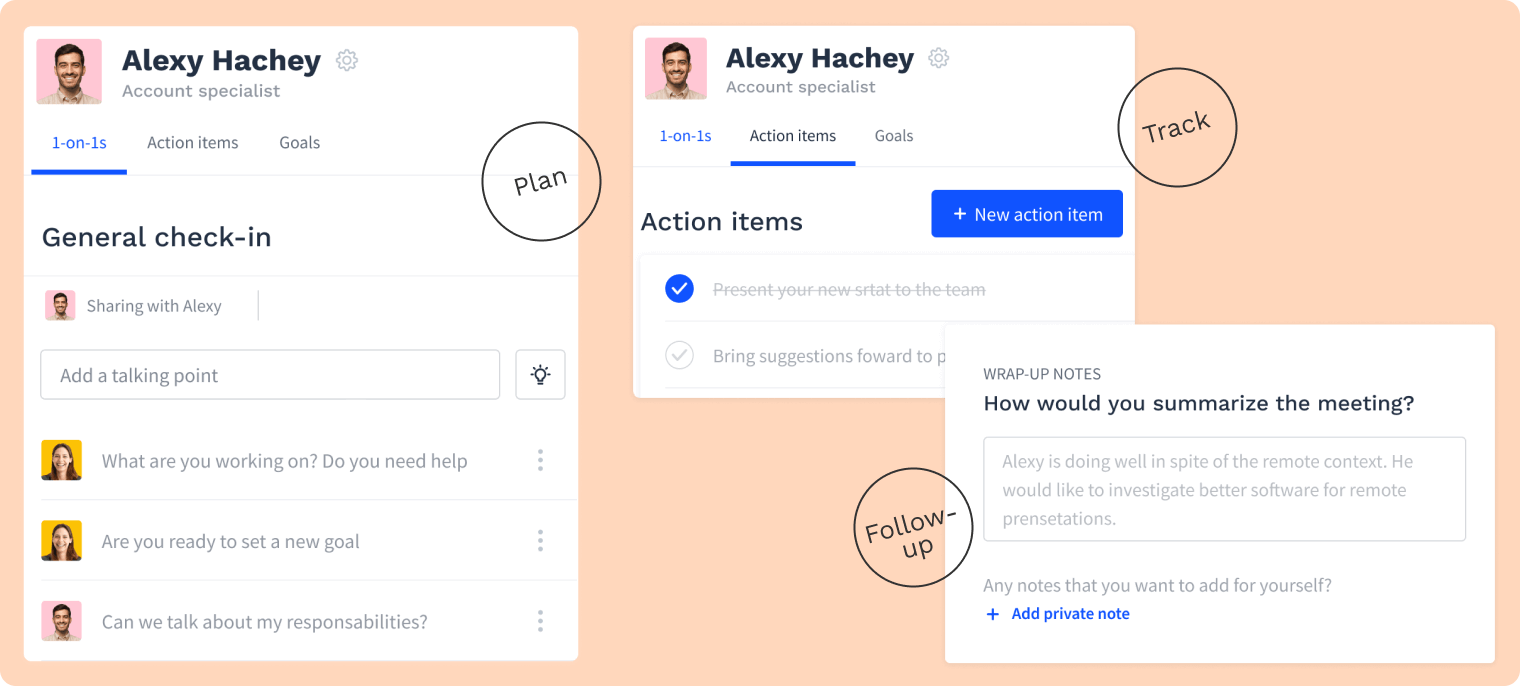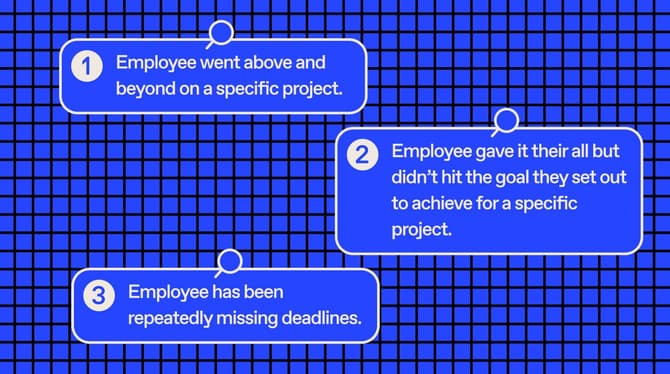When it comes to touching base with employees, keeping track of their workload and deliverables, and just checking in on a personal level, one-on-one meeting questions are the way to go. While one-on-one meetings are a great time to ask your direct reports any important questions you have for them, they also serve as a great time to address any questions your direct reports might have for you.
As a manager, you have a long to-do list and many moving parts to keep track of. As a result, you might not always have the time to craft the perfect questions for your one-on-one meetings. Sometimes, it can be challenging to know what one-on-one meeting questions to ask managers and employees or what you should be discussing with your team members.
We get it. So to help you get enough feedback (and valuable insights!) we’ve put together a handy list to keep you on track, dividing them by subject. Because, after all, if you’re not asking the right questions, you might not be reaping all the benefits of one-on-ones.
Use the following questions to efficiently set discussion points in your next one-on-one meeting agenda so that you can focus on your employees’ answers, and the next steps that come from these meaningful conversations.
Assess your organization’s employee experience in minutes

What's in this article
How to structure one-on-one meetings
Before even jumping into one-on-ones, it’s important to brush up on how to structure them appropriately. While the conversations should always feel natural, preparing for them will help you feel confident in your approach and can even help improve communication and build trust over time.
Whether you want to talk about professional development opportunities, company culture, or anything in between, a one-on-one meeting template can help you get started and master your one-on-one conversation!
The great thing about a template is that it still allows you to stay true to your management style and put your personal touch on it. Managers and employees alike will benefit from proper preparation and structure.
While different types of meetings call for different structures, the goal is to cover the right talking points and follow up on action items. For example, a classic one-on-one meeting generally follows these steps:
1. Informal check-in (5 minutes)
2. Recent work recap (10 minutes)
3. Upcoming work preparation (10 minutes)
4. Wrap-up and set action items (10 minutes)
A goal-setting meeting will follow a different structure, with some preparation ahead of time:
1. Employee self-reflection (before your one-on-one meeting)
2. Setting individual employee goals (during your one-on-one meeting)
3. Establish smaller action items (wrapping up your one-on-one meeting)
Now let’s jump into the questions, shall we?
50 One-on-one meeting questions
Now that we’ve explored the structure of one-on-one meetings, let’s walk through the kinds of questions you can ask in each situation. From general check-ins and career development meetings to personal or difficult conversations, we’ve got you covered.
Come prepared with appropriate questions for the meeting in order to cover everything on the agenda and maintain a great flow.
Questions to check in with employees
Whether it’s your first one-on-one with an employee or you’ve been having regular sessions for a long time, it’s always good to have a check-in meeting. Open up your next regular one-on-one conversation with a meeting question from the list below.
These questions will help you understand what’s on your team member’s mind, so you can direct the conversation from there during your check-in:
- Can you tell me about what you’ve been working on and how it’s going?
- What’s been on your mind concerning work these last two weeks?
- Can you share a recent example of a work situation where you thrived? What were the key components that led to your success?
💡 Did you know? Open and honest communication between managers and employees can have a huge impact on employee motivation, satisfaction, and even productivity. So having one-on-ones regularly can even help with employee retention. In fact, a recent study showed that high employee engagement actually results in 18% more productivity (Gallup).

Other managers themselves are often some of the best people to ask for tips on having better one-on-one conversations.
Questions about personal life
While chatting about career goals and offering constructive criticism is an important part of one-on-ones, it’s also important to show an interest in their personal life. How employees feel in the day-to-day is often a reflection of what’s going on outside of the workplace.
Not only does tapping into this help build a better relationship, it also plays a big role in building trust. At the end of the day, we are all human. It’s important for everyone to be able to talk about the challenges they are facing, as well as the non-work highlights they would love to share.
At the same time, it's also important to maintain the balance between being personal and remaining professional. While it's necessary to show that you care, it's also important to ensure and respect privacy.
To help you navigate this, here are some questions to ask when you want to check in with your employees on a personal level, without being invasive.
- How are you doing, and how is life outside of work lately?
- How do you feel your work/life balance is right now?
- Is there something you enjoy doing in your free time that you feel you haven’t had time for lately?
- Is there something you wish you could change about work that would positively impact your personal life? What would that be?
Pro tip: Be specific whenever you can. If they have children, ask their names and be sure to check-in and ask questions about them. If there has recently been a holiday or a life event, ask about that too.
Showing an interest, remembering little personal details, and having these relatable conversations can make a world of difference in an employee’s day.
Questions about employee engagement and motivation
So many factors that contribute to employee engagement and motivation, so tapping into what those are is key. After all, a successful business runs on employees who are driven and content in their role and career progression.
Sometimes the biggest challenge managers face is making sure their team stays motivated and kicking ass, so these meeting questions are designed to find out what they’re enjoying, what they’re not, and how you can address the challenges they face:
- Are you excited about what you’re currently working on?
- What motivates you to come to work?
- How do you feel about our upcoming projects?
- Do you sometimes feel bored or unchallenged at work? If so, how can we make your day-to-day more motivating?
Questions about employee performance
Success is a two-way street. Employees perform better when the company succeeds in listening to their needs and responding in a way that enables them to hit their goals. Performance management helps with professional growth, which in turn contributes to company success.
Here are some questions to ask to ensure you’re receiving feedback that can help boost employee performance:
- What skills or behaviors do you demonstrate at work that are a win-win for you and for your team or company?
- Do you ever have to work on more than one task at a time? If so, how could your duties and your responsibilities be reorganized so that you avoid having to multitask?
- In your judgment, what does our company value or expect from you regarding your performance? Have you had the opportunity to satisfy these expectations or actualize these values in your work?
- In your judgment, is the method for evaluating and awarding one’s job performance justified and fair?
Pro tip: Have performance review meetings with new hires after their first 30 days, 60 days, and 90 days to set the tone for future performance discussions.
One-on-one questions about team alignment
Staying aligned takes some finessing, but finding the right balance is always possible when done right. Having your team aligned can help improve performance and increase employee satisfaction (win-win!).
Deep dive into these questions to assess what’s working, and what can be done to increase alignment:
- Do your colleagues know when they can interrupt you? If not, how could you communicate this to them without it undermining your ability to collaborate?
- Are there things happening on the team that make it difficult to collaborate?
- Do you feel the team has sufficient resources (IT, human, budgetary, material, or other) to achieve our shared team goals?
- If there was one thing you could see our team or company accomplish, what would it be? What would help you or your team to achieve it? What do you think might get in the way?
Pro tip: Officevibe is the ultimate tool for getting everyone to focus in the same direction.
Questions about professional development
When it comes to professional development, everyone has their own career aspirations. From learning new skills to building long-term goals, growth is subjective. That’s why it’s essential to find out what matters to each employee, the direction they want to take, and the career goals they have.
HR leaders and managers alike can benefit from having these career conversations in order to help each individual grow.
Ask these professional development questions in your next one-on-one:
- Do you feel like you’re making progress in your role?
- Do you feel challenged at work? Are you learning new things?
- What is something we could do to help you achieve your short and long-term goals?
- Do you feel we’re helping you advance your career at the pace you want?
- Are there any events you’d like to attend or training you’d like to have to help you develop your skills?
💡 Did you know? 1 in 3 employees say they don’t have someone at work who helps them grow and develop (Officevibe Pulse Survey data).
A workplace mentor can be a great way to help further an employee’s professional development. Get tips on how to mentor an employee.
One-on-one questions about employee challenges
No role comes without its share of challenges. Whether it's learning how to manage distractions (at the office or while working remotely!), day-to-day problems with communication, or even an issue with the company culture, employees should always be encouraged to speak up.
Remedying these issues and blockers will help improve employee satisfaction and performance. Even if past managers haven’t taken the time to take employees’ grievances into consideration, you certainly can!
Here are some useful questions to ask in your future meetings (on-site and with remote teams):
- What elements of your work environment cause the most frequent interruptions to your productivity and how could you remedy this problem?
- In your judgment, is your workload reasonable? If it isn’t, can you suggest solutions that we could implement together to address the problem?
- What are the best ways for you to communicate with me when you find you lack resources whether IT, human, budgetary, material, or others?
- What are the best ways for you to communicate with me when your role and your responsibilities at work aren’t clear to you?
💡 Did you know? Remote workers face a number of challenges that aren’t necessarily faced in the office. Since a recent study has stated that a quarter of working hours will continue to be worked remotely (BNN Bloomberg), it’s important to ensure that remote employees’ challenges will continue to be addressed.
Check out 6 proven solutions to common distributed teams challenges.
Ask questions about recognition preferences
Being recognized for your work is a huge motivational force for employees. But how they receive positive feedback can differ. Checking in to ask about the method and frequency is a great way to keep employees on track with their accomplishments and recognized in the way they want.
Ask these questions when checking in during your one-on-ones:
- In what context would you prefer the good work you’ve done to be underscored?
- What kind of employee recognition would have the most positive impact on you? Do you prefer voiced appreciation of your input during team meetings, positive feedback from me in one-on-one meetings, team activities that highlight the success of a given project, or something else?
- Do you make an effort to recognize your peers’ work and accomplishments?
- Is there something we could do as a team to improve recognition?
Employee feedback and communication questions
Similarly to recognition preferences, it’s also important to ask your employees how they like to receive feedback in general. Some employees take well to receiving feedback and constructive criticism, while other employees require a different approach. Getting to know what works and what doesn’t is key.
Here are some straightforward meeting questions you can ask each individual:
- How do you prefer to receive feedback?
- Is there a piece of constructive feedback that you received recently that was particularly helpful? Why?
- Do you feel comfortable offering your colleagues feedback on the work you collaborate on?
- Is there anything I could give you feedback on right now, or any feedback you might have for me?
Pro tip: Check out our employee feedback guide for managers and find out how to give constructive feedback that helps your team.
One-on-one meeting questions about career goals
Setting career goals helps to keep employees on track and focused on where they want to be in both the short term and the long term. But it’s a manager’s role to help them determine what those are, and how to stay on track when trying to achieve them.
Asking the right one-on-one meeting questions is a great place to start:
- Do you need to have a clearer picture of how your individual career goals allow us to attain our goals as a team or a company?
- Do you need my help identifying which actions could help you achieve your long-term goals?
- As things stand, do you think you will be able to achieve your goal?
- Do you think that we should work together to revise your goal, or set new ones?
Setting employee goals can be tough. In Officevibe, you can set individual goals collaboratively with employees, and connect them with your team’s collective goals. From there, you can set smaller action items at every one-on-one meeting, so your team members are set up for success to achieve.
Ask questions about employee work-life balance, wellness, and stress.
Just like the importance of asking questions about an employee’s personal life, checking in on their work-life balance is also crucial. Now more than ever there is a focus on managing stress and taking care of mental health.
Be sure to ask the right questions to let your team know you are listening and that you support a healthy balance:
- How are you prioritizing work-life balance?
- Do you feel comfortable taking breaks, time off, and making use of flexible work policies?
- Can you give me concrete examples of stressful situations you experience at work?
- In your judgment, what’s causing the stress? Is it a sense that you lack control, a feeling that you aren’t proficient, or difficulties dealing with unpredictable or new aspects of your job?
- Are you able to ask colleagues with more experience than yourself for help, support, or input when it comes to managing stressful situations?
- What do I do as a manager already, and need to continue to do, to support our team’s physical and mental well-being?
Pro tip: Checking in on your employees’ mental health can be a sensitive thing to handle, but it is a necessary one. A mental health template can be a great guide in helping you navigate through asking the right questions.
Questions to wrap up and set next steps
From career development to an employee’s wellbeing, every issue is worth diligently following up on. Personal productivity questions are just as important as work culture questions, so these open-ended options can cater to everything and anything that may be on an employee's mind during your meetings.
- What’s one thing you’ll put into place in the next week or two based on our conversation?
- Is there a specific talking point we should circle back to in our next meeting?
- Before we wrap up, can you think of anything I could do to help you out?
If agreeing to the next steps is important, tracking them is even more so. Officevibe lets you assign every action item (to your team member or yourself!) at the end of each meeting. Then, it sends you an email on Mondays to remind you of your commitments.
Action items automatically carry over to your next one-on-one agenda on the platform, so you never lose track of what you both said you’d do.
One-on-one meeting best practices
Now that you’ve navigated your way through each section of questions addressing topics like career growth, growing more soft skills, challenges while working remotely, and so much more, it’s a great time to check out the ultimate one-on-one meetings guide for more ideas to get you fully prepared for your upcoming meetings.
It’s got all the best practices, top tips, and insider knowledge you need in your toolbelt as a manager.
Get well equipped
You’re a great manager, and these questions will help you have great conversations with every direct report on your team. Whether it’s discussing goals, having a difficult conversation, getting a status update, or checking in on wellbeing, with Officevibe you’re well-equipped to cover any talking point needed.
Equip HR and managers with tools to engage, recognize, and drive performance.




